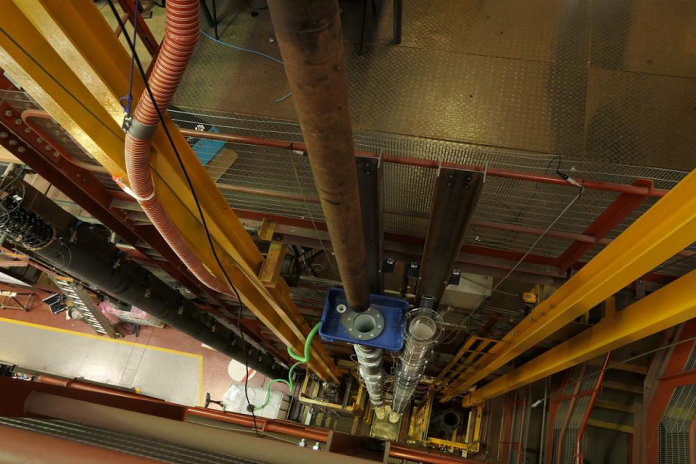A cutting-edge engineering system to seal deep boreholes is being tested as part of Radioactive Waste Management’s (RWM) preparations for an underground disposal facility for UK radioactive waste.
As part of a £5 million research project, scientists, engineers and geologists from RWM have worked with Jacobs – a leading engineering company – to research, design and build a state-of-the-art ‘Downhole Placement System’(DPS) that will be lowered from a 25-metre rig to seal boreholes at depth. Projects such as this bring to life one small part of the research and development (R&D) programme that will support construction of a safe, secure Geological Disposal Facility (GDF).
A GDF could be safely developed in three different rock types; higher-strength, lower-strength sedimentary and evaporite rocks; the DPS has been designed to seal boreholes in any of these geological settings.
The full-scale demonstration project is firstly taking place in Harwell, Oxfordshire, at an NDA-owned site managed by Magnox, where there are existing boreholes up to 400 metres deep, originally drilled in the 1980s. When the Harwell borehole, in lower-strength sedimentary Oxford clay, is sealed in spring 2021, the DPS will move on to demonstrate its capabilities in Cornwall’s higher-strength rock in late 2021/early 2022. Work to seal a borehole in an evaporite salt rock location will follow.
One of the boreholes we’ll be sealing at the Harwell site
The material to be used to seal the boreholes is called bentonite, which has very low permeability. Bentonite will also be used as buffer material packed around waste packages in a GDF, where it will form an additional long-term barrier to groundwater and gas movement.
RWM is responsible for identifying a suitable site for a GDF in England or Wales, a process based on seeking consent from a willing community. No site has yet been selected for a GDF.
Dr Mohammed Sammur, Technical Director at RWM, said, “It’s been hugely exciting to see our research reach this stage, demonstrating that we are prepared for formal site investigation work in the future. We carry out extensive R&D into all aspects of a GDF to understand exactly the requirements for designing, building and operating a facility up to 1,000 metres deep – it will need to be safe for many hundreds of thousands of years.
We’re grateful to Magnox for accommodating our project and assisting us – it was fortunate to locate suitable boreholes so close to our headquarters.
The UK is dotted with thousands of boreholes, drilled for a wide variety of purposes ranging from pure research to locating water and investigating coal, oil, gas or mineral resources.
Once a potential UK search area for a future GDF has been identified and a Community Partnership has been formed, RWM will begin geological investigations. A series of deep boreholes will be drilled, starting a comprehensive process to establish whether the underlying rocks could be suitable. It is anticipated that this stage is several years away.
The UK regulators, the Environment Agency will be reviewing RWM’s research project and all future work, providing invaluable feedback and formal approvals and licences as the programme progresses.
For more information on RWM’s R&D, see Research at RWM







